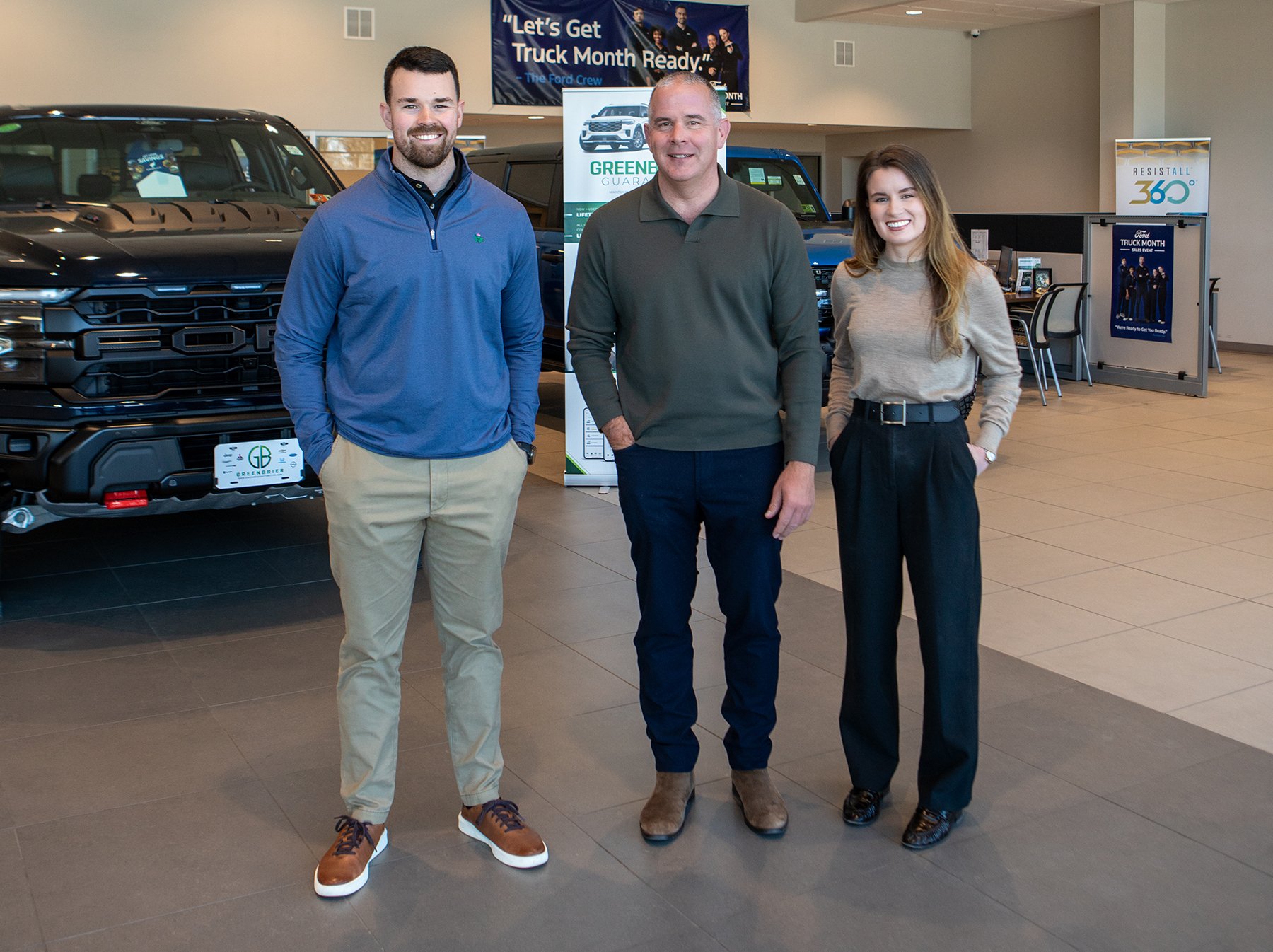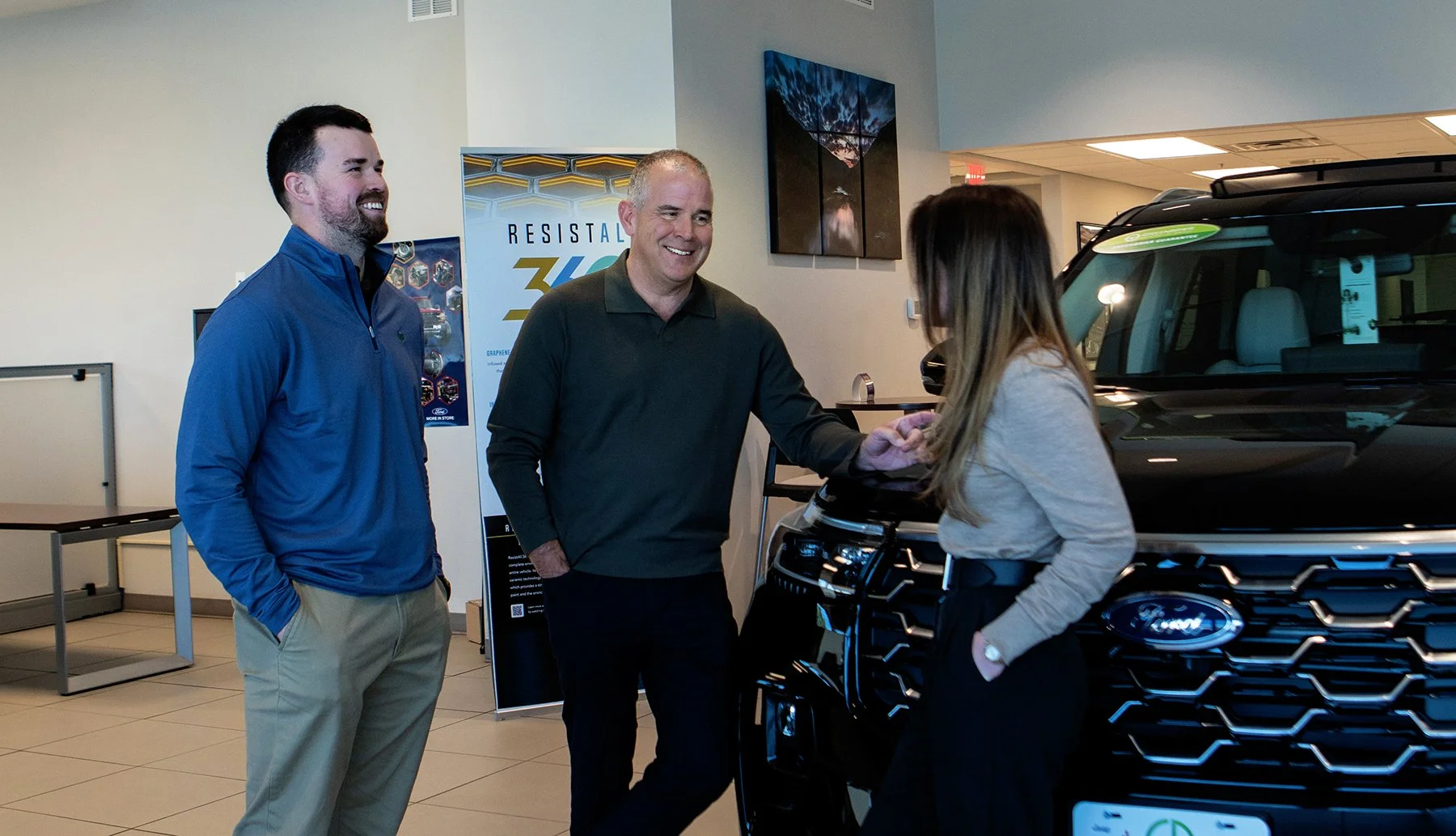Greenbrier Automotive Group Looks to the Future

By Greg Johnson | Photography by Mary Baldwin
Years ago in the 1980s, when we lived in Monroe County, a student at Greenbrier East High School would occasionally show up to mow his grandmother’s yard next door. We watched him steer his Snapper lawn tractor around, then tackle the harder-to-get spots with a push mower. Polite and content, he always went about his work diligently. If we could have afforded to hire someone to do our yard, we would have tried to recruit him.
Fast forward a few decades and the teenager, Steve Talbott, has grown up to be one of the Greenbrier Valley’s most successful business leaders, the owner of an array of car dealerships known collectively as Greenbrier Automotive Group. Steve, his son Grant and daughter Olivia, operate an impressive business empire in Greenbrier and Raleigh Counties, selling 3500-4000 cars every year, doing $200 million in annual business and providing their 220 employees well-paying jobs with full benefits. They like to point out that car dealerships have a lot of moving parts, and they do more than just sell vehicles.
It all started with Steve’s late father, Bill Talbott, a Monroe Countian who grew up working on his family’s dairy farm in Pickaway. In between milking cows, Bill sold cars at the Jeep dealership in Union. Returning from a stint in the Army, he took a job at Greenbrier Motors in Fairlea. His love of the car business led Bill and his wife Dorothy to purchase Greenbrier Motors from the owner in the 1960s. A kind, soft-spoken, well-respected man, and former president of the West Virginia Automobile and Truck Dealers Association, he remained active in the business until his death in 2020 at the age of 84.
Steve went off to college at Northwood University in Michigan, which has a unique program in Automotive Marketing and Management. He wasn’t back in West Virginia long before a tempting opportunity arose in 1991—the chance to buy Griffith-Bryant Ford, a longtime local dealership. He renamed it Colonial Ford, and set out to build his own business. His father had set a shining example, operating in an honest, unassuming way without the flamboyant, in-your-face advertising that a lot of people seem to think is necessary in the automobile business. Grant and Olivia are cut from the same cloth, and so is Steve’s brother David, who is a manager at Greenbrier Motors; you aren’t likely to see the Talbotts hawking their wares in manic overdrive on local TV.
The portfolio of dealerships grew substantially with the purchase of Bill Lewis Chevrolet in 2014, and then Beckley Ford and Mitsubishi in 2020. A more recent addition, Honda Nissan in Covington, Virginia, will result in this dealership moving to Lewisburg, affording Greenbrier Valley residents the opportunity to buy these popular vehicles and have them serviced locally. They’ve rebranded their ever-growing family of dealerships with the Greenbrier name.
“When I started at the Ford store in the 90s, we had 30-some employees and we did about $4 million a year in business,” Steve recalls. “The F-150 truck has always been our best seller, and back in those days you could buy one for $15,000. When the price went over $20,000, I was worried we’d never sell another one. Then it went over $30,000, then $40,000, then $50,000, and they were still selling. Now they’re $70,000 and people are still finding ways to buy them.”
A lot has changed besides the prices, mostly because of technology. “We used to handwrite our bank contracts,” he points out. “Now everything is computerized and digitalized—the vehicles, the paperwork, the parts department, advertising on Facebook and streaming services and websites. But the fundamentals are still the same. What we call fixed operations—service, parts and body work—are a big part of what we do. We probably see 100-150 service customers a day, and do 40 body jobs a week at the Collision Center. But it’s always been true that nothing happens if we don’t sell cars. It all starts there.”
Most of the technology is welcome. “We used to go to out-of-state auto auctions to get used vehicles. We’d go to Greensboro and stand in line with a bidder number, looking at the cars, trying to make good decisions. Now we sit in the office and watch the auctions online. You see the mileage, the condition reports and the car’s history. You spend an hour or two on Wednesday putting in bids and your cars are delivered on Saturday.”
Like all car dealers, they rode through a rough period during the COVID epidemic, which resulted in a very visible lack of inventory. Then higher interest rates came along and discouraged some buyers. “We’re still recovering from all that,” he admits.
Steve is pleased that Grant, 30, and Olivia, 28, decided to join the business. “I never pushed them to go into it. I said get an education, and if you want to come back and work in the business, fine.” They both took winding paths to get back home.
“I grew up doing odd jobs around the store,” Grant says. “I washed cars, and I worked in parts and the body shop. I didn’t think working at a dealership was for me. I went to WVU, got a degree in mining engineering and went to work in Charlotte for Martin Marietta. It’s a company that supplies construction aggregates, cement and concrete and asphalt. I was working as assistant manager at a quarry, and my manager pointed out that I seemed to be going back to West Virginia a lot. The wheels started turning and I realized I didn’t like living in Charlotte. I like the Greenbrier Valley and I decided it was where I wanted to live. I didn’t want to be just another young person who left the state. I realized that because of our business I could come back and help affect change by supplying jobs for people at a living wage, by being involved in the community, and by charitable giving.”
“I’ve always been outdoor-oriented, and the Greenbrier Valley offers all the opportunity in the world to enjoy that. It’s also a wonderful place to raise a family. My wife, Erika, and I have a 3-year-old son, Jackson. We talk all the time about how fortunate we are to live in a place where we feel our friends and our community will be there as our children grow, and be invested in their well-being.”
Drone Photo of Lewisburg Dealerships by Evan Blumenstein
Like her brother, Olivia didn’t think working at a car dealership was in the cards. After earning a degree in finance from the College of Charleston in South Carolina, she set her sights on Wall Street. “I went to work as a financial advisor with Merrill Lynch in Charlotte. I was 21 and they wanted me to bring in major clients! I had some frustration with the corporate world and it started to wear on me. Then the team I was working with decided to leave, COVID happened and I couldn’t even go back to my office. My grandfather passed away, and I came home and started helping out here. I used to think the career opportunities and challenges I wanted weren’t here. Fortunately, I discovered they really are. I learned that there’s a financial backside to the car business and a place for me. It’s nothing like I thought I’d be doing, but I really enjoy it. It’s been a whirlwind. Every day is different.”
If you want to hear the Sound of Silence, ask Grant and Olivia what their job titles are. They essentially form a three-person ownership team with their dad, doing a lot of everything in a business that’s actually 5 or 6 different types of businesses. They even wholesale auto parts throughout the region, serving Collision Centers from Lynchburg to the Shenandoah Valley, down to Bristol and Kingsport.
Steve, Grant and Olivia are pleased their success enables them to give back to the community by supplying cars for the driver’s ed programs at Greenbrier East and Greenbrier West, and supporting organizations like Hospice, the Animal Shelter, 4-H, FFA, Little League, sports teams, bands, Carnegie Hall and the Greenbrier Valley Theatre.
One aspect Steve particularly enjoys is helping people find new careers. “It’s gratifying for us when we hire someone without a college education who’s been working in the service industry. We give them training and tools, and they’re making two or three times as much as they were before. I like seeing that. People may not realize that we offer some of the higher paying jobs in the area, with health insurance and a 401K.”
“With 220 positions, we’re constantly hiring,” Olivia adds. “We have jobs for just about anything. Marketing, accounting, technicians, salespeople, human resources. We’ve grown to the point of having to hire a recruiting firm to help us find people for certain positions.”
They don’t feel West Virginia has felt the impact of electric vehicles as much as some other places. “We sell a few,” Grant says, “but they’re more popular in urban areas where people have 5-mile commutes. In a metro area you might drive 60 miles a week. In a rural area you can drive 60 miles a day, and West Virginia hasn’t invested much in charging infrastructure. You seldom see people here who have it as their only vehicle. They usually have a gas or hybrid backup. We see more demand for hybrids than electrics.”
He does notice the beginning of a consumer shift to more economical vehicles. While F-150’s, Explorers, Grand Cherokees, Tahoes and Suburbans are ever popular, he sees a growing interest in smaller vehicles in the $25,000-$35,000 range, ones that “aren’t outfitted with massage seats and screens galore but are safe, reliable and easy to operate”.
Even though he walked away from a job at a rockpile in Charlotte, another one is about to play a role in the family’s future. Across the street from the Chevrolet dealership in Lewisburg, tucked out of view from passersby on U.S. 219, an undeveloped 34-acre parcel stretches over to Fairview Road. Known locally as The Rockpile because of its stony composition and the challenge of developing it, the site will eventually become the new headquarters for the Greenbrier Automotive Group and house several of their dealerships, including Honda and Nissan. The project is still in the planning stage. The property’s ample size could leave room for apartments and/or retail space. Apartments are very much on their mind because difficulty finding affordable housing is the number one issue cited by people moving to the area.
When you talk with the Talbotts, you realize you’re dealing with three articulate, progressive, hardworking people whose success isn’t accidental. It was Bill Talbott’s good luck that he had the right son, grandson and granddaughter to grow the business he started 60 years ago, and it’s the Greenbrier Valley’s good luck that, in an age and place where vehicles are necessities, we have all this available locally.
All things considered, the kid who was mowing the lawn next door has done okay.








